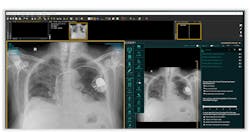A study published in the Journal of the American College of Radiology projects that new U.S. Food and Drug Administration (FDA)-approved artificial intelligence (AI) medical imaging products will increase five-fold by 2035.
The research from the Harvey L. Neiman Health Policy Institute (HPI) and American College of Radiology Data Science Institute (DSI) projected the number of new FDA-approved products using the historical relationship between the number of new products and past AI venture capital funding.
Using DSI and venture capital funding data from Rock Health’s Digital Funding Reports, the study found that annual AI funding grew from $2 billion in 2013 to $13 billion in 2022. It currently takes about six years from funding to FDA approval, and the study projects there will be 147 new AI products in 2028, based on the $13 billion in funding in 2022.
"As radiologists' workload continues to increase, AI will be a crucial tool to manage this growth over the next few decades," said Keith Dreyer, D.O., Ph.D., ACR DSI Chief Science Officer and Chief Data Science Officer at Massachusetts General Hospital and Brigham and Women’s Hospital, in a statement.
Assuming that future funding follows the same linear trend it has previously, the study projects funding will be $30.8 billion in 2029. FDA-approved products from that funding would appear in 2035.
“Given the relationship between funding and new AI products, we project there will be 350 new AI products in 2035 corresponding to the 2029 funding level given the lag between funding and approved products. This is a five-fold increase from 69 in 2022,” said Eric Christensen, Ph.D., research director at the Neiman Health Policy Institute, in a statement.
"Artificial intelligence has grown rapidly and is already changing the way healthcare professionals work," said Christopher Treml, DSI director of operations, in a statement. "Based on this research, we expect that growth to continue accelerating over the next decade and change the field in new and exciting ways as AI products are developed and integrated into practice."


